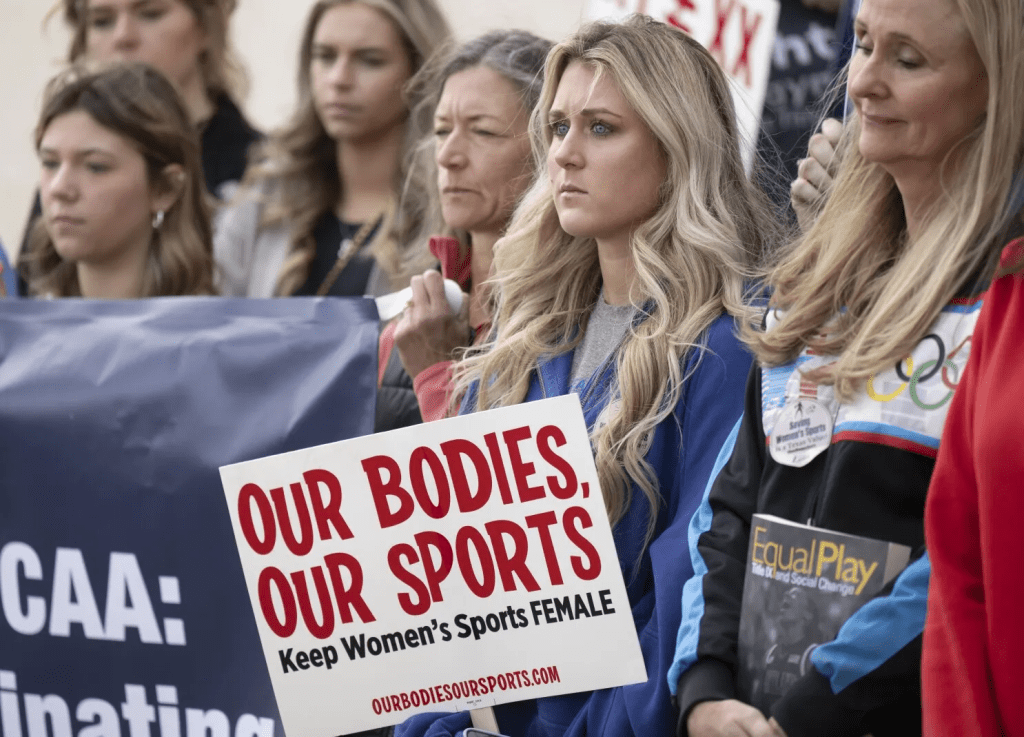
NCAA Revokes Lia Thomas’ Medals Amid Ongoing Debate on Fairness in Women’s Sports
In a surprising and highly debated decision, the NCAA has stripped transgender swimmer Lia Thomas of all her medals, reigniting discussions on fairness and inclusion in women’s collegiate sports. As a result, Riley Gaines, one of Thomas’ most outspoken critics, may receive the titles that were previously awarded to Thomas.
The Beginning of the Controversy
Lia Thomas, a former swimmer for the University of Pennsylvania, became a central figure in the debate over competitive fairness when she transitioned from competing in the men’s category to the women’s division. Despite complying with NCAA regulations regarding hormone levels, her dominant performances sparked criticism from athletes, coaches, and sports analysts.

One of the most vocal critics, Riley Gaines from the University of Kentucky, argued that Thomas had an unfair advantage due to biological differences. Gaines, who tied with Thomas in the 200-meter freestyle at the NCAA Championships, has consistently advocated for changes in policies to ensure fairness in women’s sports.
NCAA’s Decision and Its Impact
The NCAA’s decision to revoke Thomas’ medals comes after mounting pressure from sports organizations and lawmakers advocating for fairness in female competitions. In an official statement, the NCAA explained that a review of regulations and past cases led to this determination.

“Our commitment to fairness and inclusion in collegiate sports requires us to continuously reassess our policies. This decision reflects our effort to ensure all athletes compete on a level playing field,” an NCAA spokesperson stated.
As a result of this decision, the NCAA has opened the possibility of redistributing the medals to swimmers who placed behind Thomas in those events. This could mean that Riley Gaines and other competitors may be officially recognized as champions in events where Thomas previously won.
Divided Reactions in the Sports Community
Unsurprisingly, the decision has sparked mixed reactions. Advocates for fairness in women’s sports have praised the ruling as a step toward protecting female athletes, while supporters of transgender inclusion have condemned it as a setback for LGBTQ+ rights in sports.
Riley Gaines expressed her satisfaction on social media, stating, “For too long, we were told to accept injustice. Today, this decision proves that fairness matters and that the hard work of female athletes deserves respect.”
Conversely, organizations such as Athlete Ally, which champions LGBTQ+ inclusion in sports, criticized the ruling, arguing that it sets a dangerous precedent for discrimination. “Lia Thomas competed under the rules in place at the time. Stripping her medals now sends an alarming message to all transgender athletes seeking a place in sports,” the organization said in a statement.
The Future of Collegiate Swimming and NCAA Policy Revisions
The Lia Thomas case has prompted the NCAA and other governing bodies to reconsider policies regarding transgender athletes in women’s competitions. Recently, the International Swimming Federation (FINA) implemented stricter eligibility criteria, allowing only those who transitioned before puberty to compete in the female category.
The NCAA has since announced plans to align its regulations with those of FINA and the International Olympic Committee (IOC), which may significantly restrict transgender athletes’ participation in women’s events moving forward.
Conclusion
The revocation of Lia Thomas’ medals and the potential reassignment of titles to athletes like Riley Gaines mark a significant turning point in the ongoing debate over fairness in collegiate sports. While some view this as a necessary correction to maintain competitive integrity, others see it as a discriminatory measure that could limit transgender athletes’ opportunities in the future. As the conversation continues, the NCAA’s policies will likely remain under intense scrutiny.


